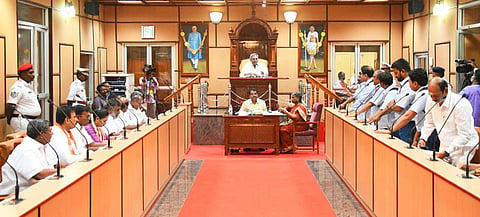

When Union Law Minister Kiren Rijju recently attended a function at Puducherry, he acceded to one of the two significant requests made by the chief minister: to set up a bench of the Madras High Court at Puducherry. The other and more politically & constitutionally significant request was granting statehood to Puducherry, on which the minister was silent.
While the Constitutional problems faced by the Delhi Chief Minister, or by elected governments of big states’ like Tamil Nadu are discussed widely in the media, unfortunately for the people of Puducherry, their smaller territory & population keeps their peculiar Constitutional problems away from deliberations among the larger Indian public.
Recently the CM publicly disclosed that the attitude of officers was causing him stress and the only solution to the same was statehood for Puducherry. At this juncture, it is pertinent that the earlier Council of Ministers headed by Chief Minister Narayanasamy did not complete its tenure and had to resign because the confidence motion initiated by the CM was almost defeated at the instance of three MLAs nominated by the union government who helped opposition members outnumber MLAs from the ruling party.
At this context, it is relevant to note that in 1962, with an intention to grant ‘Statehood’ gradually to certain unique political units (including formerly Part – C States), Article 239A was inserted in the Constitution empowering Parliament to establish legislature and Council of Ministers to certain Union Territories (UT). By 1989, all UTs with legislature under Article 239A, except Puducherry, attained Statehood.
Consequently, Parliament established the legislature & Council of Ministers at Puducherry vide the Government of UTs Act, 1963 laying down their powers, functions and enunciating their relationship with the ‘administrator’ known as the L-G. The natural question that arose is: Is the L-G is empowered to override any authority created under the Act because Article 239 of the Constitution says UTs are administered by the President through the administrator?
In 2019, the Madras High Court declared that the L-G cannot normally interfere with the day-to-day affairs of the Council of Ministers. However, in 2020, a division bench of the Court set aside the order since ‘a decree of Court cannot lay down the status’ but advised the L-G to act in unison with the Council of Ministers. Due to silence in law, it is unclear on how the L-G would act in unison with the Council.
A bare perusal of the Act of 1963 shows it adopts the provisions of Part VI of the Constitution, which lays down the powers and functions of the Governor, Council of Ministers, Legislature etc., of ‘The States’ extensively with some exceptions. Moreover, the rules of business of Government of Pondicherry, 1963 provides under Rule 6(2) that the ‘Minister in-charge of the department shall be primarily responsible for the disposal of business pertaining to that department.’ Can power & the corresponding responsibility be vested with different people?
In June 2017, the Ministry of Home Affairs provided certain clarifications to the CM that the L-G had powers to call for papers/file and request the cabinet to update him on any query/doubt. However, Article 167 of the Constitution gives those powers even to the Governor of State and therefore these rules cannot automatically mean that the L-G possesses powers to override the decisions of the Council of Ministers at Puducherry.
Interestingly Article 240 of the Constitution, which empowers the President to make regulations for the peace, progress and good governance of certain UTs, takes away such powers with respect to Puducherry after creation of its legislature. It is therefore difficult to conclude that L-G prevails over the elected government at Puducherry under all circumstances.
Considering the role of MLAs nominated by the Union Government, on which the law is again silent, in a parliamentary democracy, immediately after elections to the legislature, the Governor/administrator, invites the leader of the single largest party (or political alliance) to form the government. If ‘Party Y’ is the ruling party in the union government, and three MLAs are nominated by the union government from the party; can the Puducherry government formed by ‘Party-X’ with 16 out of 30 elected MLAs be toppled with the help of three MLAs nominated from ‘Party Y’? If it can be, then what is the relevance of people’s mandate?
All of this demands ‘statehood’ for Puducherry. Till then, the peculiar Constitutional set up at Puducherry polity can do little good to the people.
Footnote is a weekly column that discusses issues relating to Tamil Nadu
Article 240
Article 240 of the Constitution, which empowers the President to make regulations for peace, progress and good governance of certain UTs, takes away such powers with respect to Puducherry after creation of its legislature
Advocate, Madras High Court, nirmalkumar.m.law @gmail.com